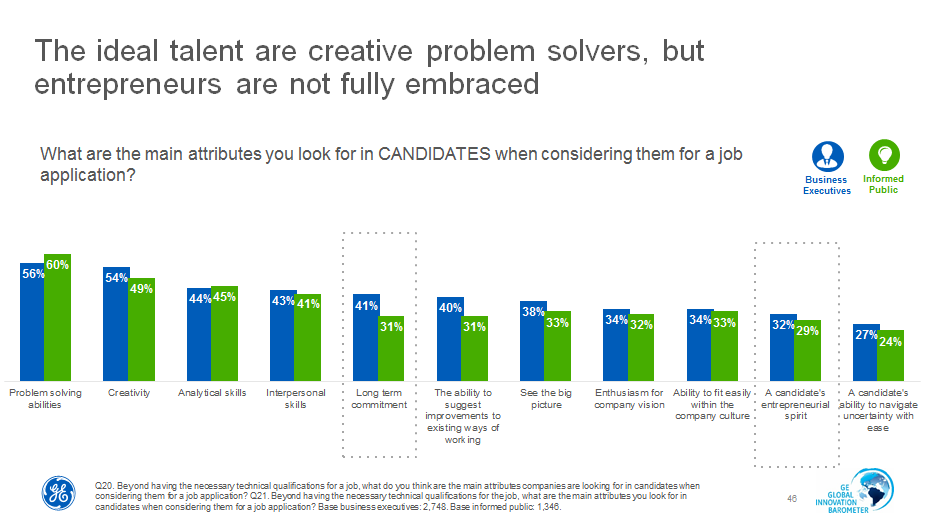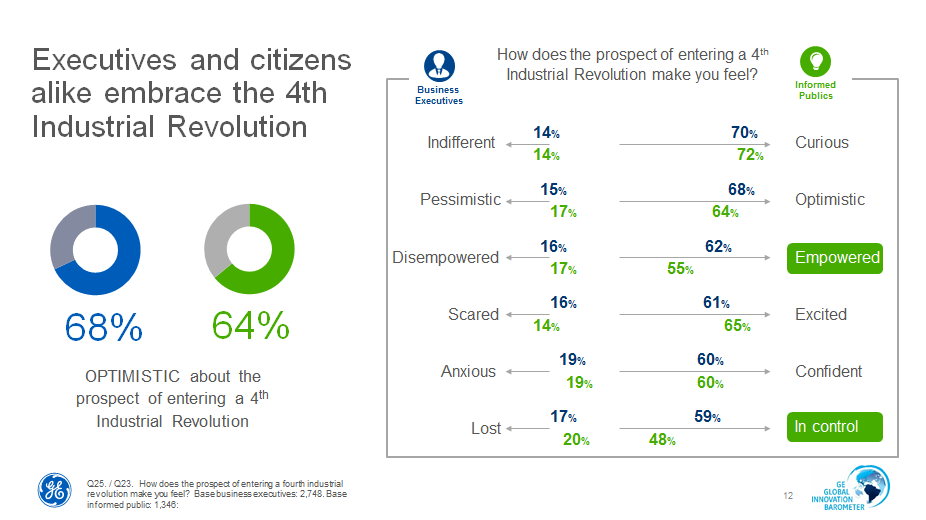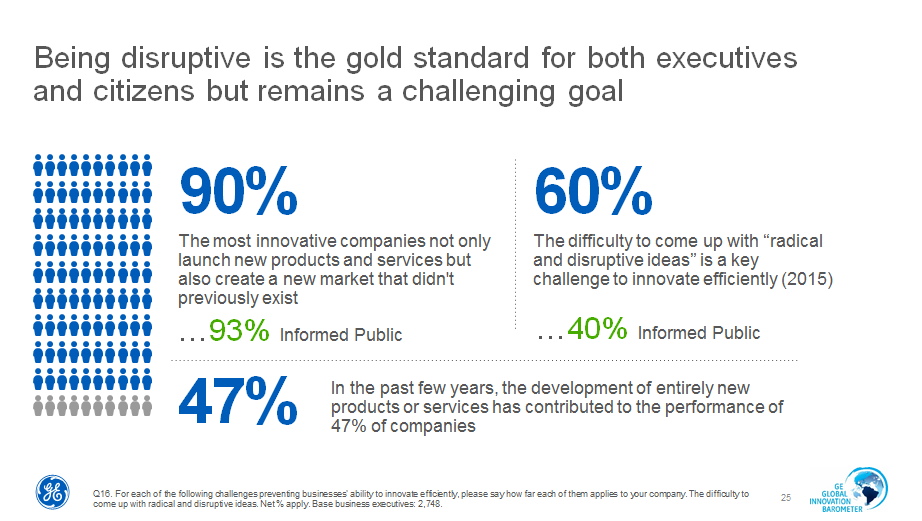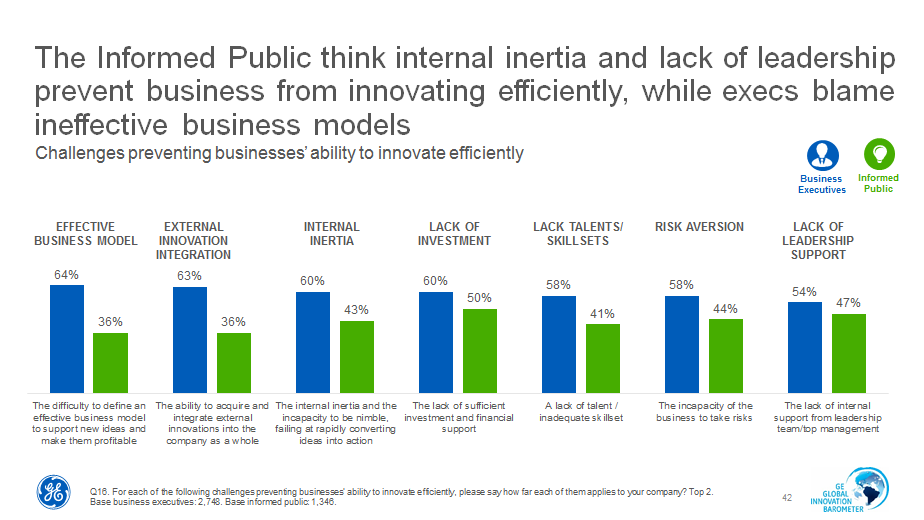 I always look particularly forward to this report as it provides a range of insights that are shaping our world and how innovation is adapting and altering this.
I always look particularly forward to this report as it provides a range of insights that are shaping our world and how innovation is adapting and altering this.
Now the report in its fifth edition, it is now spanning 23 countries where the opinions of senior innovation executives or the equivalent are sought out, covering 2,748 executives, with 1,915 being in the C-Suite.
This year the barometer decided to explore the perceptions of the (informed) public for their thoughts on innovation’s growing impact and in particular, the future of work and they interviewed 1,346 to gain some useful insights and pointers that separate business and the citizen in their understandings.
The report covers a significant amount of areas across innovation. Here I wanted to pull out just a couple that initially caught my eye. I might add to this in further posts.
The top line according to GE has six supporting key findings, many supporting their strategy, which sometimes leaves me uncomfortable but partly expected. Are they just looking for their own validation but are they drawing out the downsides and implications that might bring and challenge their model. Hopefully yes, they do have a head-start over many in the way they have been undertaking transformation in my opinion.
The top supported findings were:
- Creativity and problem-solving will be key for future work forces
- Minds and machines are working together (expected perhaps from GE)
- The ROI on Collaboration is constantly improving
- The Emerging markets are more fearless in embracing innovation
- The (constant) call for greater Government support to break down barriers
- The energy sector is ripe for disruption (again GE specific)
The four main themes that did emerge from the key findings from this report see’s pressure is rising but optimism as still prevailing. These needs considering as they do cover some of the critical forces that will push or limit the 4th Industrial Revolution many are talking about and discussed further below. These are:
- A welcome revolution. Both business executives and informed citizens are optimistic about the digital transformation of the world. In emerging markets they actually feel “empowered” by this as a radical transformation point. More on that later
- The Embracing of New Models and Technologies. The continued adapting of investments, partnerships and collaboration opportunities will inform decision-making far more.
- Disruptive Innovation: the solution and the challenge. The recognition that business needs to innovate radically most are mindful of the risk, yet fear being left behind and obsolete.
- Everybody’s starting up. The balance between safer, pursuing incremental innovation and protecting the core business is growing. Inertia and risk-aversion are growing. Yet meanwhile the “start-up” ethos is growing creating different innovation cultures within companies of all sizes.
Getting past the GE shaping in the opening part of the report when you dig a little deeper there are plenty of ‘nuggets of pure gold. I want to pick out a few only here. There seems a lot of denial, delusion and inertia under the surface.
Firstly setting this into context: The 4th Industrial Revolution is challenging us all
This report is timed for the Davos meeting of the World Economic Forum 2016, starting this week. Within the themes this year is the 4th Industrial Revolution is one of the main focal points, I felt we ought to bring this into this review of mine.
Dr. Klaus Schwab, the founder and executive chairman of the WEF wrote about this 4th revolution recently. He points out we stand on the brink of a technological revolution altering the fundamental ways we live, work and relate to one another. This is rapidly underway for each of us. It has scale, scope and complexity that is unlike what has come before. It is characterized, in his opinion, by a fusion of technologies that are blurring the lines between the physical, digital and biological spheres.
Its power will lie in velocity, scope and impact it will bring, more breakthroughs, exponential rather than linear in pace and will disrupt almost every industry in every country, it will eventually, sooner than later transform entire systems of production, management and governance.
The real fear is on the impact on business
The impact on business will be huge. In Dr.Schwab’s constant conversations with global CEO’s is that the acceleration of innovation and the velocity of disruption are for most hard to comprehend, or even anticipate. The drivers of this revolution will deliver constant surprise, even for the best connected and most well informed.
Entirely new ways of serving needs, massively changing value chains disrupted constantly will require highly agile responses as the growing access to global digital platforms will oust well-established incumbents with improving on quality, speed, price and availability to serve emerging needs that are highly valued by the end user.
The main effects of this 4th revolution will be on seeing different customer expectations, changing rapidly product and service enhancements, the need for constantly adapting and collaborating in different ecosystems of partners and constantly changing organizational forms.
Nearly all we know in business will require some significant level of rethinking. It is against this scene the GE Global Innovation Barometer helps to unpick much of the complexity. The GE Innovation Barometer report is extensive it what it is providing. It has many avenues to explore
Early ‘stand-outs’ for me from this Barometer report at first glance
The aspects I pick out initially here are around Digital Darwinism, and The Start-Up Ethos, Internal Inertia and Ineffective Business Models
Digital Darwinism or is it simply full-swing Darwinism?
The consensus of both the business executive and the informed public is that more and more businesses face extinction, rapidly becoming obsolete, as technology is evolving far faster than many can adapt too. The feeling is that only a few are performing as quick adapters and implementing emerging technologies, many are simply lagging. One that I tend to believe does explore and exploit is GE, although its leaderships foresight and speed with the need to adapt is struggling to equally bring its organization up to speed, possibly it is not working “all the pumps” on this one. It needs too.
The gold standard is “being disruptive” but it is such a challenging goal. According to the report, even though 90% of innovating companies are claiming they not just launching new products and services but are creating a new market that did not exist previously.
Now I must admit I just find this totally at odds with what I see or read on a constant basis. I really would want to dispute this or those making this claim have very low threshold of what they define as ‘new’ and being created. Is this more delusional, believing incremental innovation is determining “new” in the broadest sense, to simply justify this claim? So where is all the real growth in the worlds business organizations then if this claim is valid? A question going beyond “not only launch” but ones that are proving real impact on the top and the bottom line (defined criteria needed) would define innovation a little better.
Time and time again I read reports on the lack of innovation, of dedicated resources, even the leadership has such limited time to put behind innovation. I really question this result.
Also 47% are claiming the development of entirely new products or services has contributed to the performance, yet 60% state it is difficult to come up with radical and disruptive ideas is still a key challenge. Definitions of ‘new’ certainly need clarifying. This slide shown can be highly misleading on real innovation progress.
Turning to the Digital Darwinism, it is not just digital in my mind, it is in understanding what is really in need of radically changing and adapting that companies need to do, in innovating to meet this revolution that is clearly underway.
On the other side of this positive view of innovating reported, we then get the result that the majority of business executives continue to favor a “safer” approach to innovation. They want to maximize existing revenue (58% of those interviewed), protect the core (64%) with only 34% recognizing the development of new business models has contributed to the performance within their company. That is more in line with what I ‘see’ in the market.
The report also points out most businesses innovate incrementally as a way to mitigate risks, even while speed to market is increasingly a differentiator. 63% use incremental to improve existing products and solutions, while 46% try to get to market as quickly as possible to keep an edge over (existing) competitors (for me viewing in the back mirror) and not scanning for the upstarts or disruptive forces coming from different places .
When you look at the country breakdown, this protecting the core is dominant for most countries and a real lack of looking for long term payoff for innovation dominates company thinking. Most executives within most countries have difficulty coming up with radical and disruptive ideas with a growing challenge the highest concern in the USA, South Korea, France, Canada, Japan, Sweden, with the one sizable exception being China.
A growing perception difference on Innovating
The informed public think internal inertia and lack of leadership prevents business from innovating efficiently, while the exec blames ineffective business models (the poor worker blames his tools perhaps). The report specifically asked each, the business exec and the informed public to clarify the challenges preventing businesses ability to innovate efficiently. To level inertia and lack of leadership is a damning reflection of what the public think holds innovation back. I would not disagree.
Darwinism is certainly tapping on every organization’s door in the need for evolution. There are new ideas, concepts, combinations and much more all emerging. If organizations hold onto the totally mistaken belief that incremental will allow them to survive then we are seeing many heading for extinction.
In the past business has found ways where they thrived through stable markets and interlocking in ways we have known to keep thriving. In recent years we are losing many of our known beacons of business , whole rafts of previously well-established business sectors or industries, or ones are being forced to merge as they failed to evolve.
We will continue to lose many of our present organization as they are approaching the edge of a sheer cliff from keeping in denial.
Is this any different from our endangered wildlife species we are in the early stages of a mass extinction event if our businesses fail to become more radical, prepared to disrupt and challenge in a fashion unknown before. Of course the future is unknown but there are things we do know and we need to adapt and work with what we are being provided in this revolutionary period.
The fear of being obsolete is worrying that it is becoming faster than many can adapt to, it seems. This is something each business leader has to face up to and radically change within themselves and their organizations. It is the challenge of today.
I would say, others may not agree but I feel GE are attempting to head of these warnings in their way and taking to heart much within the Barometers past and present.
The “Start-Up” ethos and the chase for the talent has growing implications
- How are different parts of the world trying to catch up, leapfrog over others and become more radical to make this valuable to them?
- How is the larger company equally attempting to stay incremental for their core to protect it but also in using this “start-up” ethos increasingly?
The challenge is how to create an innovation culture within companies of all sizes that allow this- often referred to as the “dual” approach of simultaneously exploiting and exploring.
The report observes with digital transformation there is the rise of the nomad employee. These individuals do not seek full-time employment but favor freelancing or contracting modes. 71% of Business Executives confirm this trend and 84% of the informed public (the very people searching for this). This has implications on building a loyal cadre of employees or holding them within the one environment without significant adjustments to changing the working environment.
It is from the questions to the informed public they see the top elements to create a more productive work environment as 89% flexible working hours with a level of freedom to choose these working hours, 80% want participative management principles with a growing say and 79% want remote working on a regular basis. Other productive environments consist of flexible holidays (75%), more open (flexible) offices (71%), Minimal hierarchy (69%), Satellite offices (62%), participative salaries (60%) and hot desking facilities (50%)
 The interesting ‘tension’ within companies is they are looking for creative problem solvers but this entrepreneur spirit is not fully embraced. The “start-up ethos” is not being fully exploited as it potentially might challenge the core and unleash ‘uncontrolled’ disruption within the organization that prides itself at being, foremost efficient and effective. These often run counter to entrepreneurship, and innovation.
The interesting ‘tension’ within companies is they are looking for creative problem solvers but this entrepreneur spirit is not fully embraced. The “start-up ethos” is not being fully exploited as it potentially might challenge the core and unleash ‘uncontrolled’ disruption within the organization that prides itself at being, foremost efficient and effective. These often run counter to entrepreneurship, and innovation.
The main attributes are still aligned to the business as usual not the need to think new Business Models, become more radical, look to be disruptive, although the Business Executive thinks perhaps they are embracing this “ethos”, the effort supporting these initiatives are “just but a toe in the water” testing the concept today.
Again I feel some level of denial, of not wanting to really embrace or face up to the real race for talent. Often we mistakenly ask the question to the company “what do you look for in candidates” but it is the candidate today that is asking “do I fancy working for them” and how does it fit in my personal journey, in my terms and wishes to achieve.
We come back to the embracing of the 4th Industrial Revolution
It was surprising within the Barometer report that most Business Execs and informed public are optimistic in embracing the 4th Industrial Revolution. That was surprising.
 Embracing any future is full of uncertainty. According to this report there is surprising optimism, even some feeling of empowerment and the developing countries are leading this charge. Indonesia, Nigeria, Israel, Turkey, Algeria, China, Mexico, India, Poland, Malaysia, Brazil, Russia and South Africa feel certain positivity.
Embracing any future is full of uncertainty. According to this report there is surprising optimism, even some feeling of empowerment and the developing countries are leading this charge. Indonesia, Nigeria, Israel, Turkey, Algeria, China, Mexico, India, Poland, Malaysia, Brazil, Russia and South Africa feel certain positivity.
Those stuck in uncertainty are the ones who lose the most, these being Australia, Canada, USA, Sweden, France, South Korea, Germany and Japan.
It is within this group of ‘reluctant’ countries we find the most tension. The fear and needs in protecting the core, the difficulty of implementing (or wanting too) new business models, the worries of becoming obsolete, of being disrupted alongside the pressures of failing to attract and hold the talent as they are fighting in some respects and not fully embracing the “start up ethos.”
There is a lot to lose but equally to win. By not accepting that within any revolution, you can’t simply defend, you have to know where and how to attack, adapt and experiment, learning to evolve and embrace the changes at a really agile speed. Playing safe is not a winning option.
Safety first is a long-term losing strategy in my opinion
This ‘safer’ approach really needs changing. The absolute need is to embrace a more radical, disruptive stance of advancement. The urgency is where the leadership should be really taking the important time of working all the revolutionary forces, exploring them, making them work to understand their changing environment, then disruption will be a force that catches them completely out. The CEO should devolve the day-to-day to the COO and get back to much deeper strategic thinking.
The challenging that needs to go on today is that most of the existing, prevailing assumptions are needing revising, even uprooting, forcing of the operating teams to relentless adapt, and become continuously good at innovating through new business models, products and services. Leaders need to be a whole lot bolder in setting a disruptive, technology driven agenda that radically alters the present offering. GE is certainly attempting this in my opinion.
We need to guide the evolution and find ways that are mostly yet to come so we have to be highly adaptive. We need to break out of linear thinking, stop being absorbed by multiple crises and think strategically and longer-tern about all that is disrupting us and how innovation must shape the future.
The GE Innovation Barometer can only signpost, it is for us to extract the value it provides to help in any change journey. Find a copy and understand its implications on you personally, and more importantly its implications on your business.
Here is a link into the GE Innovation Barometer Report 2016.

